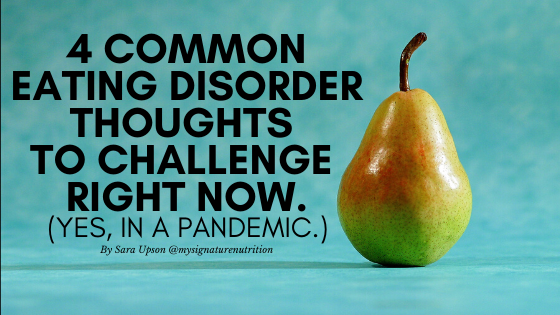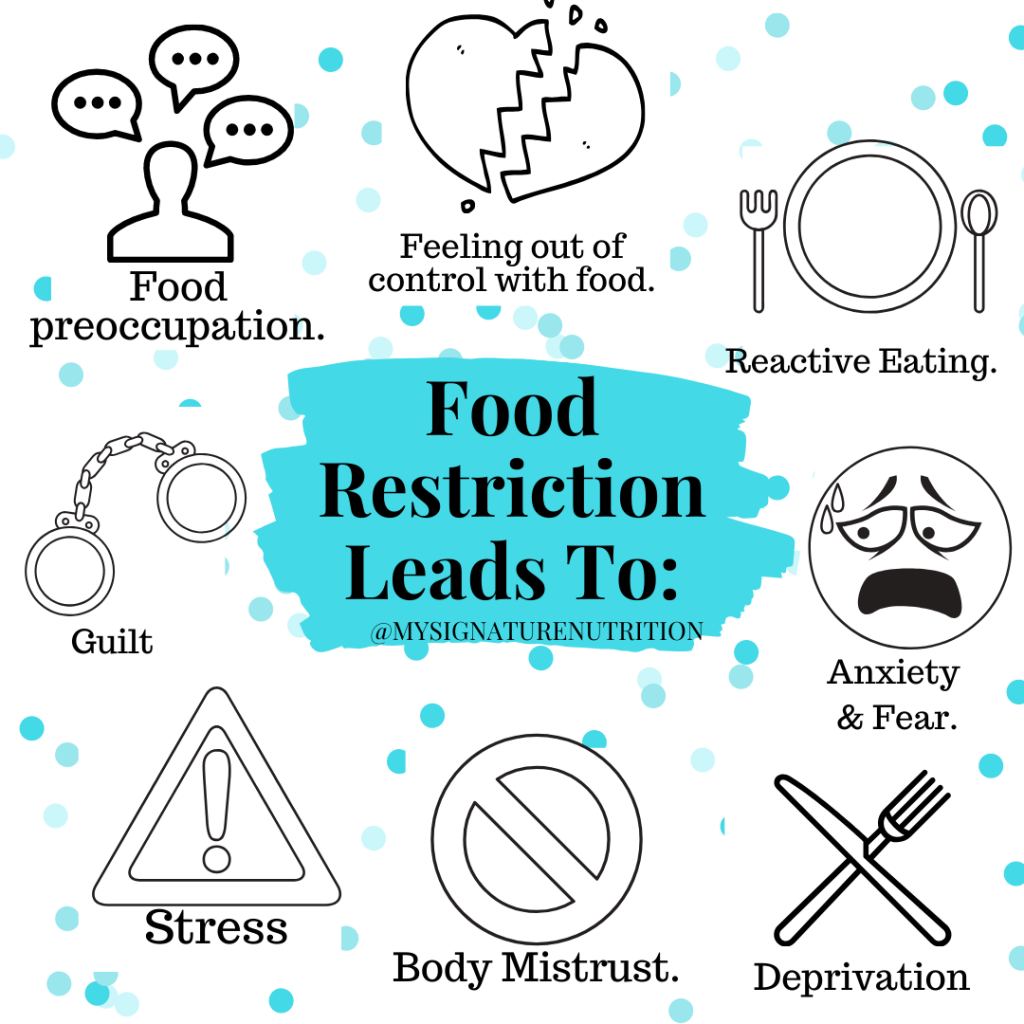4 Common Eating Disorder Thoughts To Challenge Right Now. (Yes, In a Pandemic.)
April 6th, 2020 by Sara Upson

There’s a common theme of struggling amidst quarantine, anxiety, fear of the unknown, and significant unexpected shifts to life that I’ve noticed meeting with clients (virtually of course) through COVID-19.
With everything going on it makes sense. Eating disorder recovery is hard. Healing your relationship with food is hard. Doing so during a pandemic is so much harder.
The stress of the situation keeps pulling thoughts back to your body, eating or exercise- but the thoughts aren’t about your body (they’re really diet culture or the eating disorder- you can read more about that here). The thoughts have a function and are trying to help you feel better, but they don’t serve you.
These thoughts aren’t random and often present in similar ways. I’m sharing the thoughts I’ve heard most frequently here (with responses) in hopes they can help you also. If any of these thoughts sound familiar or resonate with you- use that to remember that they’re not random and that you’re not alone in you’re struggling. Keep fighting- and please reach out for support if you’re struggling.
Thought: I’m not hungry, I don’t have an appetite so I don’t need to eat.
Alternative Thought: You have to eat- no matter what.
Your body needs foods to function. Enough food. Consistent food. Satisfying food. Ideally food that you enjoy.
That being said, it may harder to get food currently and with the stress of the world and life right now you may not have an appetite, food may not sound good, you may not have any hunger or fullness cues, no desire to eat, not be able to get what you want, struggling with increased thoughts about food, feeling guilty for eating, or any other reason- AND you still have to eat.

Stress and strong emotions with everything going on will likely make eating harder, but it’s not a reason to not eat. Instead focus on following your meal plan or other consistent eating pattern. Commit to eating adequate food consistently throughout the day. Commit to eating no matter what- and don’t let your eating disorder or diet culture convince you otherwise.
You may have thoughts of feeling like you shouldn’t eat, or that getting food is greedy or that you should restrict to help others- but no matter the reason or how the thoughts present- you need food. Your body needs food. And you need food multiple times per day every day. This is healing and most supportive to you, your body and your recovery.
Thought: I couldn’t get what I needed so I just won’t eat.
Alternative Thought: It is harder to get what you need and you still need to eat even if the food you desire or need isn’t available.
Flexibility is so important right now! It’s hard to find so many things at the store: flour, milk, meat, bread, eggs, etc. That does make it harder to follow your meal plan or eat consistently- but it’s not a reason to not eat.
Even if you can’t get the food you want or the food that sounds good or the precise food on your plan- you have to eat. Being flexible is instrumental here. Remember, a grain is a grain, a protein is a protein, a fat is a fat- and if you can’t get exactly what you need, you can get something close to it.

Your body needs food and it isn’t nearly as judgmental as your brain. Honor your body and your recovery by committing to eating enough food and being flexible around food choices. Yes, it might feel hard, be scary and be anxiety provoking and you can do it!
Thought: I should be exercising, then I’d feel better.
Alternative Thought: You don’t have to exercise and it may not be supportive to you.
It seems like everywhere you turn people are reminding you to exercise for stress management, for your health, to “manage your body weight”, or to be productive. Here’s the thing to know- exercise might be helpful, not helpful, or even harmful. And exercise may or may not make you feel better or even be health promoting. Even though diet culture says it’s the solution, exercise is certainly not the solution to everything.
If you’ve been advised not to exercise (for any reason) then exercise is not supportive to you. Choosing to exercise even though you’ve been advised not to is not supportive to recovery, won’t heal your relationship with food, and won’t be helpful- instead it’s harmful. Even if you “feel better” after you exercise in the short term- in the long term it’s not consistent with health or recovery.
Even if you’re cleared for exercise- that doesn’t mean it’s helpful. Sometimes exercise might be positive- but sometimes it might not be. Forcing yourself to exercise, exercising even though you desire rest- feeling obligated to exercise aren’t signs of joyful movement or consistent with healing your relationship with food. It’s the opposite. It’s okay if you don’t feel like moving your body right now. Living during a pandemic is stressful- even if it feels like you’re not doing anything or should be doing more. Sometimes the thing your body needs most is rest- not activity- even during this time.

And for some people exercise will be helpful- but that doesn’t mean engage in excessive exercise, exercise more or complete exercise challenges. It means find movement that feels enjoyable to you. That you want to do and helps you feel better. Find flexibility around activity- some days you may want to do it and some days you won’t. Honor that. When you do this it’s supportive to healing your relationship with food and feeling better.
And through all of this- keep in mind that exercising in an attempt to manage your body weight- is counterproductive. It creates disordered thought patterns around exercise, takes the joy out of activity, and in the long run leads to decreased activity- exercise resistance- not more. If you’ve struggled with these thoughts in the past- it takes a while to make change. Be patient!
In summary- move your body in a way that is consistent with your treatment teams’ recommendations, notice the difference of how you feel when you don’t, and know that you don’t have to exercise.
Thought: I’m not doing anything so I don’t need to eat (or eat as much).
Alternative Thought: You don’t have to earn your food.
With quarantine, schools closed, many people working from home, and not going anywhere in general it’s easy to feel like you’re not doing anything. Plus- the stress of everything going on also leads to fatigue, decreased mood, low energy- which makes it harder. AND, if you’re anything like most of the people I work with- then you also have critical thoughts like- “I should be doing more,” “I’m not doing anything,” “I’m being so lazy,” which all lead to a culminating thought of “I don’t need to eat, or I should eat less.”
While this might be a common thought pattern the truth is- you don’t have to do anything to earn your food. Your body needs food no matter what or how much you’re doing. And on top of that, you deserve to eat just as you are. Diet culture says that you have to earn your food, that you need to eat the “right” way, and that you shouldn’t enjoy what you eat. This couldn’t be further from the truth.

You DON’T have to earn your food. You need food every day, multiple times per day, to keep you alive and to allow you do whatever it is that you love doing. This is true even if you lie in bed all day or don’t do anything.
You have to eat and you don’t have to do something to be able to eat. Period. Your body has to have nutrition every day and you are worthy of pleasurable food, satisfying food, whatever feels good to you. You don’t have to earn your food.
If you’re feeling out of control with food or feel like you can’t stop eating- keep in mind that these behaviors are often driven by restriction, by the belief that you shouldn’t be eating or should be eating less. If you’re struggling with feeling like you’re eating all the time or can’t stop- check in with yourself. Are you restricting food? Are you telling yourself you shouldn’t be eating certain foods? Is there a sense of deprivation with food? If so, keep in mind that this food restriction creates more interest with food and often leads to reactive eating. To make matters worse, food scarcity at the grocery store can lead to feelings of deprivation and also lead back to reactive eating. It is a hard time right now.

If you’re struggling with your eating, you’re not alone. It’s okay to need more support, to reach out for help to ask for what you need. The struggle is real. The emotions and thought are overwhelming and your eating disorder will be there waiting to help you- when in reality it’s a trap that leads to relapse. You don’t need that at this time or any time. Instead- remember to eat, nourish your body, rest, relax, sleep, reach out for support- and reject diet culture.
Hang in there!
Comments are closed.





